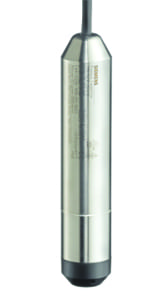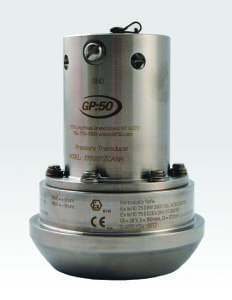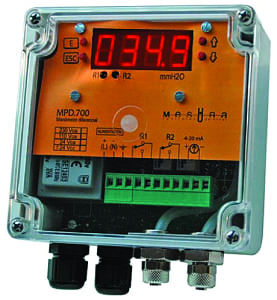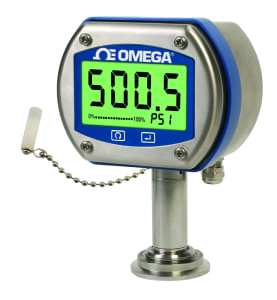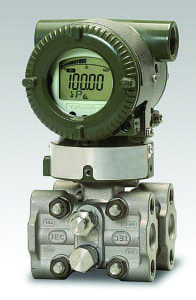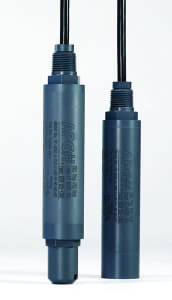A small-diameter, submersible pressure transmitter
The Sitrans LH100 series pressure transmitter converts level-proportional hydrostatic pressure into a standardized 4–20-mA signal. Mostly used for measurement applications in the drinking water and wastewater industries, the Sitrans LH100 offers 0.3% accuracy and is available in a variety of measurement ranges. The transmitter is fully submersible, and has a slim 0.92-in. diameter, allowing it to be mounted in pipes as small as 1-in. in diameter. The instrument’s stainless-steel housing and ceramic sensor provide resilience in harsh conditions. The Sitrans LH100 is fitted with an integrated humidity filter, permitting simple installation without the need for a junction box. — Siemens Industry Sector, Erlangen, Germany
Compensated, unamplified sensors in a compact package
The TBP Series of basic board-mount pressure sensors have a millivolt output sensor that is compensated and unamplified, so that users can do their own amplification while retaining maximum resolution. The TBP Series features a wide pressure range of 1 to 150 psi, and has a very small footprint, occupying only 7 × 7 mm on the process-control board. A wide compensated temperature range of 0 to 85ºC allows the sensors to operate in many types of applications. Low power usage enables use in battery operations. — Honeywell Sensing and Control, Columbus, Ohio
Rugged pressure transmitters with many signal-output options
The Model 170/70/370/570 WECO Hammer Union Series of rugged pressure transmitters is engineered for installation in extremely demanding industrial environments, including those with shock and vibration. With stainless-steel housing and corrosion-resistant fasteners, these devices also incorporate a connector guard, which recesses the connector and eliminates breakage risks. The Series’ four available signal-output options provide pressure-transducer compatibility with most control systems. An optional temperature output is also available, as well as an extended high-temperature rating of 350ºF. — GP:50 Corp., Grand Island, N.Y.
These sensors measure differential pressure in filters
PMP differential pressure (DP) sensors are designed for controlling and measuring the DP of low-pressure air or non-corrosive gases in filters. A PMP sensor measures the pressure difference before and after the filter chamber. The need for a cleaning cycle can then be determined by an increased DP, at which point the instrument activates a programmable relay. A second relay produces an alarm if the DP continues to increase. PMP sensors can be customized to users’ needs, as relay, hysteresis, time delay of the relays and analog output are programmable. — Kobold Instruments Inc., Pittsburgh, Pa.
These digital pressure gages are designed for marine applications
The new DPG409S Sanitary/Clean-In-Place (CIP) digital pressure gages incorporate a rugged stainless-steel (SS) enclosure and are designed for washdown and marine applications. With accuracy capabilities of 0.08%, these instruments are tested to industrial standards and can withstand very harsh environments. The DPG409S is available in various models, including: gage, absolute, compound gage, vacuum and barometric. Each model features an easy-to-read 25-mm backlit LCD display, with standard high and low alarms. The DPG409S has a long battery life, with data logging and charting software included. — Omega Engineering Inc., Stamford, Conn.
This vacuum transducer is equipped for harsh conditions
The 902B Absolute Piezo vacuum transducer is equipped with a microelectromechanical-system (MEMS) piezoelectric sensor with a metal-sealed, stainless-steel diaphragm and integrated electronics to provide seamless, gas-independent vacuum-pressure measurement between 0.1 and 1,000 Torr. Suitable for harsh processes and resistant to damage from air inrush and vibrations, the 902B features up to three setpoint relays and a high bakeout temperature of 100ºC. The 902B also provides both analog output and digital communication, an optional, integrated display and multiple analog output emulations. Its compact, single-unit design is mountable in any orientation. Applications for the 902B include semiconductor manufacturing, thin-film coatings, vacuum furnaces, freeze-drying, analytical instruments, medical devices and more. — MKS Instruments, Andover, Mass.
This handheld calibrator features quick pressure generation
The DPI 611 handheld pressure calibrator improves upon its predecessor by doubling pressure-generation efficiency and pressure accuracy and tripling electrical accuracy, all in a more compact package. Designed for use throughout many industrial sectors, the DPI611 is said to be the first dedicated pressure calibrator to feature touchscreen swipe technology. The screen interface displays a comprehensive application dashboard, and a task menu allows for quick setup for pressure tests and calibration. Processes can be automated with the DPI 611, significantly reducing the time required for calibration. The instrument’s pressure-generation capabilities have been significantly improved compared to previous models, with the DPI 611 able to create a 95% vacuum or generate a maximum pressure of 20 bars in just 30 s. — GE Measurement & Control, Boston, Mass.
These pressure transmitters are now ATEX certified
This company’s line of explosion-proof pressure transmitters has achieved ATEX certification for Class I Zone 0 hazardous locations. The non-sparking or non-incendive pressure transmitters are traditionally installed in applications requiring special materials, such as Alloy 718 or Alloy C276. Both the explosion-proof and non-incendive pressure-product families cover pressures from 1 to 20,000 psi. The transmitters can be ordered with compound pressure ranges for compressor applications, or bi-directional pressures for vapor-recovery systems. — American Sensor Technologies, Inc., Mt. Olive, N.J.
Low-power model added to this family of transmitters
The DPharp EJA-E Series of differential pressure/pressure transmitters is now being offered in a low-power version. The new low-power transmitter outputs both 1–5 V d.c. and HART signals, and consumes just 27 mW of power. Even with the device’s decreased power usage, it still retains the accuracy and stability of standard-power models, with 0.555% accuracy. At the upper range limit, the transmitter can remain within ±0.1% for seven years. Installation is simple, as basic settings for the new DPharp transmitter can be done easily using a setting switch and an external adjustment screw on the transmitter. — Yokogawa Corp. of America, Sugar Land, Tex.
These transducers are easily zeroed in the field
Built with chemical compatibility in mind, PT-503 submersible pressure transducers feature polyvinyl chloride (PVC) housing that enables them to operate under prolonged exposure to harsh or corrosive materials, in temperatures ranging from –30 to 130ºF and depths up to 450 ft. These transducers feature three different cables for compatibility with various chemicals, Teflon or ceramic transducer faces, built-in lightning protection and breathable hydrophobic vent-tube caps that filter out moisture. PT-503 transducers also allow for temperature compensation and are easily zeroed in the field. — Automation Products Group, Inc., Logan, Utah
Mary Page Bailey
